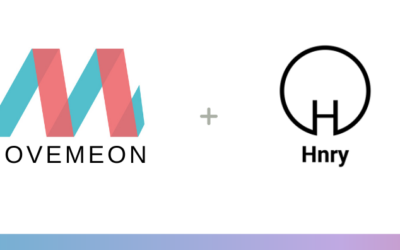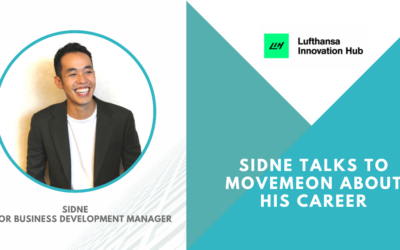Here, we speak to Ben about his journey from Bain, joining Worldpay, working as a COO at a FinTech start-up and then moving to Pollen as the managing director of Europe.
Interested in working at Pollen? Click here to view live roles
—
How did you end up at Bain, and what sort of journey took you to Pollen?
I was born and raised in New York and went to college in Texas, where I studied the US equivalent of PPE, and Japanese. I was always interested in foreign languages, and I did a study abroad program in Tokyo. After college I didn’t know what I wanted to do – a difference between the UK and the US is that in the US you choose a lot of the professional career paths (e.g lawyer or doctor) after graduating. When I was 21 or 22 I didn’t actually know what adults did for a living – my dad’s a doctor and my mom’s a lawyer, so I only knew very narrow professional services – so after university I worked for a year as a paralegal thinking I’d potentially go to law school, but I hated it. In the end, I did a Masters in diplomacy as I wanted something that had business, history, economics all mixed together.
I took a career test during my first year and it told me that I should be a management consultant – bleak it didn’t tell me I should be an artist or something more interesting! I’d heard of McKinsey but I didn’t really know what management consultants do, so I did a lot of research and got quite interested in it as a career path. Having chosen a sector, I also still wanted to do something with foreign languages so I decided to learn Spanish and focus on getting to a foreign office of a consulting firm. After all the research, I focused on getting into Bain because they were highest-ranked for prestige but also lifestyle — balance in my life is really important to me.

At the time, Bain had offices in Mexico City and Madrid, and I decided to go for the Madrid office to have access to all of Europe. Luckily, because I was in Boston for grad school, a friend of a friend who was at Harvard Business School with ties to the Madrid office introduced me so I was able to interview directly, and I got in.
This is actually my favourite professional accomplishment: learning a foreign language, doing the interviews in that language, and then being one of the few non-native speakers to get an offer!
I got to live in Madrid for a year, nightclub promoting and waiting for my work visa to come through, but when it didn’t I moved to London and started my career with Bain there. I was at Bain London for around 5 years and I did all sorts of projects across multiple sectors. Bain is very generalist – I started in financial services in Dublin, did consumer goods in Belgium, semiconductors in Cambridge, and all sorts of other things. Even though I knew there were interesting things I was taking from it, I knew I didn’t want it to be my career long-term, as even when you are not killing yourself, it’s 50-60 hours a week and you really burn out. When I thought about my next steps, I started with trying to follow my interests. One of my intellectual passions is urban development – my dream job (maybe without all the stress) would be mayor of New York City – so I focused on NY based urban policy jobs. After lots of research and chats, I managed to get a job offer from the NYC Economic Development Corporation who focus on big strategic questions the city faces. It’s my biggest professional regret turning it down, but I was 6 months away from my green card in the UK, which means you can live in the UK without needing your company to sponsor you. This was pre-Brexit so I thought it gave me access to all of Europe (insert crying face emoji). Also, I used to go back to Spain pre-COVID every month to see my friends, and I didn’t want to give that up either.
In the end, I went to WorldPay, the payments company, as at the time they were PE-owned, and they were really ramping up for their IPO so there were lots of fun strategic projects to get stuck into. Bain taught me how to be organised but WorldPay taught me about big organisations and multiple functions. At Bain, people have similar backgrounds and skillsets, but at WorldPay, there is much more variety. One interesting issue I faced was how to manage people: I was in strategy in the Product & Marketing team, driving innovation, but no reports. Without direct management responsibilities, I had to influence people, which is probably the most important thing I learned.

After the IPO, it wasn’t immediately clear what everyone was going to do, and at the same time I heard through a friend about a bank being set up for the financially excluded. As I mentioned, I have always been interested in urban policy in terms of improving the quality of life of citizens, and I saw that this new company could really create an interesting platform for the underserved. I had a bunch of interesting conversations with the founder of Pockit, and in the end he offered me the position of the COO. When I joined, Pockit was just 15 people and a very basic product – a simple current account without very much functionality. Over the course of 3 years, we scaled the company to about 75 people and tons of new product functionality. We grew to 500k customers — it was a really exciting and interesting experience, particularly because this was the beginning of the fintech boom in London (the word fintech wasn’t even being used yet!).

After Pockit, I moved to Pollen, which is a marketplace and platform for travel and music experiences targeting < 30-year-olds. My role has changed a few times, but my current focus is MD/GM of Europe. At Pollen everything I do is growth-focused. My teams include customer acquisition teams, marketing, customer support, retention, community development – the full customer lifecycle.

The commonality across my start-up career has been managing lots of different personalities and functions, thinking about how each function can drive towards the company-level strategy. My personal leadership style is to help people – listen to problems people have and help them focus on the core objectives.
The path from consulting to start-up can actually be quite difficult – your focus has clearly always been on learning from your roles, which has helped you move forward; did you have any mentors or other support?
I didn’t have any mentors; what I had was a number of gigantic failures and learnings. One thing I would advise is to always be very self-aware, to understand what’s going on around you and your own performance and learn from it. One of the biggest challenges moving out of management consultancy is that you no longer have everything structured for you from above, so you have to be looking around, seeing where you can add value. You also have to learn patience and an appreciation not everything will work perfectly instead of getting frustrated at inefficiencies and politics; management consulting firms are well-oiled machines so this can be a real shock for ex-consultants.
When I was at WorldPay I had two big failures that I can still recall: One, I was giving a big update to the executive team – people in their 30s and 40s, which at the time felt ancient to me – and made a throwaway comment about how one team wasn’t being particularly supportive on a project I was doing. This was factually correct, but the functional head immediately perked up and I could tell that I had created an issue. I learnt at that point that you need to invest in relationships ahead of meetings, and you really need to understand all the dynamics of how the teams get on. In Bain, that was handled by the partners, and the more junior people just focused on the analysis. So that was my first time learning that there are a lot of interpersonal relationships that need to be navigated.
The second big failure was while I was kicking off a big transformation project. I noticed that communication was a challenge across such a big company so I tried to invite everyone to the same meeting – something like 20 people. The meeting was a total flop as people talked over each other and we couldn’t advance the agenda at all – I looked really ineffectual in front of a bunch of my bosses. After that, I realised you have to break communication and implementation into smaller bits, get people engaged at different stages, and always be the one in control.
How do you see someone with a consulting background fitting into a start-up? Is a transition period always needed?
I don’t think that’s needed – what you need is humility; knowing that you are not going to go in and run things immediately. I couldn’t have done a COO role at a series B or a series C because I didn’t have the skills or experience; I had to learn on the job and gradually gain the requisite skillset.
You also need to be aware of what your skillset and your value is — assuming you don’t have any specialist background in something like marketing, product or engineering, what management consultants are amazing at is problem-solving in a structured context and managing lots of different things in one go. The types of things that make sense going from management consulting to startups are. managing transformational or strategy projects, something like chief of staff (sitting across the business and making sure everyone is getting on with the important stuff), or problem-solving in an ops role.
You are on parental leave as we speak – can you talk a bit about Pollen’s policy around this and diversity in general?
Our company is really passionate about diversity – we’ve set up a task force doing a full assessment of potential improvements. One of the core things we believe is that you have to listen to the team – you first need to hear from everyone about how they feel and what they would want. We are also continuing to broaden our product offering to make it as diverse as possible.
On a personal level, I try to: know everyone on my team well, make them comfortable about telling me what they think, find forums where they can talk to me if public/official channels don’t work, and set them up to succeed, which is one of the most important things to me as a manager. Not everyone has the confidence that comes from Oxbridge socialisation, which can lead some people to shrink from the spotlight.

As someone who’s worked with many Founders, and who might also be one in the future, what is your one piece of advice to others looking to start their own business?
Hire good people, trust them and pay them well. Also remember work is work, and it’s not a family or a religion. You have to remember the human element – let people work (reasonable) hours, treat them well while they are at work, and then let them go home to their real friends and families.
Click here for more insight into other organisations hiring on Movemeon.com


